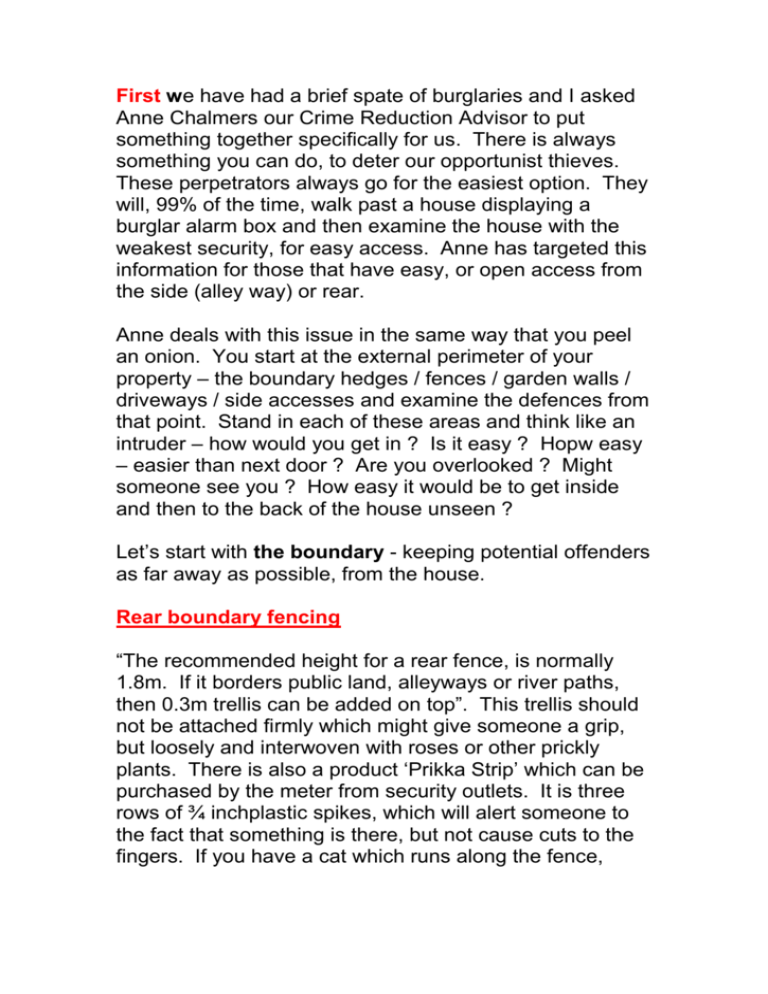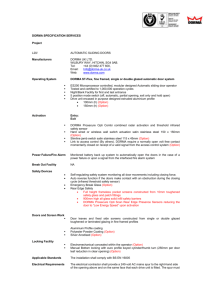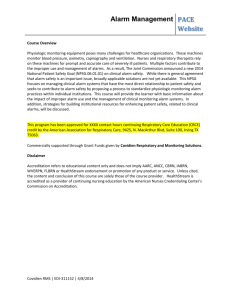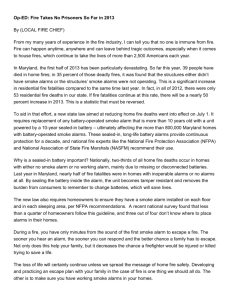Anne Chalmers Burglary Prevention Advice 25 09 2012
advertisement

First we have had a brief spate of burglaries and I asked Anne Chalmers our Crime Reduction Advisor to put something together specifically for us. There is always something you can do, to deter our opportunist thieves. These perpetrators always go for the easiest option. They will, 99% of the time, walk past a house displaying a burglar alarm box and then examine the house with the weakest security, for easy access. Anne has targeted this information for those that have easy, or open access from the side (alley way) or rear. Anne deals with this issue in the same way that you peel an onion. You start at the external perimeter of your property – the boundary hedges / fences / garden walls / driveways / side accesses and examine the defences from that point. Stand in each of these areas and think like an intruder – how would you get in ? Is it easy ? Hopw easy – easier than next door ? Are you overlooked ? Might someone see you ? How easy it would be to get inside and then to the back of the house unseen ? Let’s start with the boundary - keeping potential offenders as far away as possible, from the house. Rear boundary fencing “The recommended height for a rear fence, is normally 1.8m. If it borders public land, alleyways or river paths, then 0.3m trellis can be added on top”. This trellis should not be attached firmly which might give someone a grip, but loosely and interwoven with roses or other prickly plants. There is also a product ‘Prikka Strip’ which can be purchased by the meter from security outlets. It is three rows of ¾ inchplastic spikes, which will alert someone to the fact that something is there, but not cause cuts to the fingers. If you have a cat which runs along the fence, attach them to the inside edge where fingers would reach over to get a grip. Where residents have a ‘view’ and may wish to see the river / countryside from the house / rear garden and consequently have very low perimeter hedges, there is a solution which is possibly aesthetically acceptable and, visually permeable. This would only be considered if you felt particularly vulnerable or the problem was acute. Weld mesh fencing has been developed for just this purpose. It is secure but quite transparent. The recommended height for this fencing is between 1.5 to 1.8 m Whether you put in fencing or not, protect by the boundary by planting a wide but low defensive hedge / border to prevent anyone landing in that particular place if they have fence hopped. This again allows visibility of neighbouring green space A gate can be incorporated into these boundary fences. The gate should be the same height as the fencing and secured with a robust padlock. This option is of course gold standard and for the most severe situations. Any form of barrier tells people that the land beyond is private. Generally only those up top no good will cross it. The Next Step Lighting Anyone with a more open property should fit external security lighting. This does not only have to be fitted to the house walls, but can easily be fitted in long gardens to pick up any movement. As I recently advertised, there is a new product recently brought over from the USA – a Guard Cam. This looks and functions exactly like an external security light. It has though a hidden secret – an HDD camera which records every time the sensor is activated – day or night. The advantage at night, is of course - the subject is brilliantly lit by the security light itself. It records onto an SD RAM camera card. The pack also includes a ‘card reader’ so that you can download any footage to your computer in the same way you down load your photos from a camera. You can then email any images to the police or anyone else !!! The downside of external security lights is of course obvious – they are not a deterrent during daylight hours – but these will still record any movement. An Important Issue - Sheds and out buildings Our opportunist thieves are well known to us and are regularly stop checked. They therefore cannot carry anywhere on their person any item which the police could construe as to be used to commit crime. No screw drivers or anything that could be used to commit car crime or burglary. So – if they find a possible target, they need to find the necessary tools on site – where from ??? Sheds and garages where we all store tools of all kinds. In Old Windsor last week a garden spade was used to break security lights. First Windows Stop them looking into your shed / garage through windows to see what you have on display. Whitewash the windows, hang net curtains or use that glue on plastic frosting used in bathroom windows. Fit a grille or, as a heaper alternative, chicken wire, to slow a thief down. Bond any window glass in place with mastic to prevent easy removal Plant thorny shrubs under windows to act as a barrier, so they cannot get near a window to look inside. Next Doors Use tamper proof screws or coach bolts together with a good quality, pad bar or hasp and staple and a close shackled padlock (one where the round bar to go through the hasp is not exposed for easy cutting, but is built inside the padlock itself), to secure a shed. Lighting: • Install security lighting as a deterrent you can get solar lights for this exact purpose Shed Alarms: • A shed alarm can also be installed. PIR Shed sensor alarms are available from Red Line security Shed contents: • Ensure all tools and equipment are locked away when not in use. Secure tools within a lockable metal storage container, within your shed. • Bikes, mowers and other valuable garden tools can all be chained together to make stealing them more difficult. A tip from one our members was to buy a bucket and some large heavy chain and cement it into the bucket leaving a loop to lock everything else to !!! Every thing helps – even small things Having dealt with the perimeter and the land between that and the house: The House Itself (Shell of property) Are your doors and windows secure? Lock windows and doors, deterring easy access!!! All External doors: Wood • Locks are only as good as the door into which they are fitted. External doors and door frames should be robust and solid. BS PAS 24 is the recommended standard, if you are replacing the door. • Letterboxes should be protected with a letterbox guard – or an American style letterbox at the entrance to your property – so that no-one has the excuse to walk up your drive to deliver / put a leaflet through your door. UPVC doors • Double lock your doors with the door key at night and whenever you go out ! DO NOT LEAVE KEYS IN DOORS ! • Fitting additional security features to existing UPVC doors may weaken the door frame structure and invalidate the door warranty– I’d recommend the home owners talks with the door manufacturer The most effective deterrent: Burglar Alarms • If you have an alarm do you set it? • If you don’t have an alarm, but your neighbours do – opportunist thieves will automatically consider you the weakest option. They no longer cost a fortune and with wireless technology do not damage your decoration and are very simple to install – an operate. You use a key fob to set and unset it – no fiddling with complicated codes. • Almost all alarms now come with separate zones, so that you can set the alarm downstairs, when you go upstairs to bed or the whole house, when you go out. • Most alarms now are pet sensitive. In the past, this was the most common reason people did not set their alarms and thieves looked for evidence of a pet accordingly. • Most alarms now incorporate a sounding alarm inside the property. If ever you have been inside a house when one goes off, you will know why, - you just have to leave they are so loud Audible Alarms • Suitable for urban locations, terraced streets where neighbours / passers by, will be alerted by an alarm activation. Monitored Alarms • Suitable for remote or isolated locations or for those that don’t want to involve their neighbours. Where to go for products, manufacturers and installers First try recommendations from Neighbours, secondly local high street businesses – they have a reputation to keep up, national companies – but get several quotes, their prices do vary quite considerably • The National Security Inspectorate (NSI) www.nsi.org.uk • The Security Systems and Alarm Inspection Board (SSAIB) www.ssaib.org • Secured by Design http://www.securedbydesign.com Anne Chalmers Crime Prevention & Reduction Advisor Maidenhead,Windsor and Slough LPA's Neighbourhood Policing & Partnerships | Thames Valley Police | Land line: 01753 835467 Email: anne.chalmers@thamesvalley.pnn.police.uk That looks quite comprehensive. Let me know, or contact Anne for any further advice / recommendations. Please also be aware that all our PCSOs are fully trained to carry out Home Security Surveys and offer advice. Simply email your Neighbourhood Team on the group email address below.








